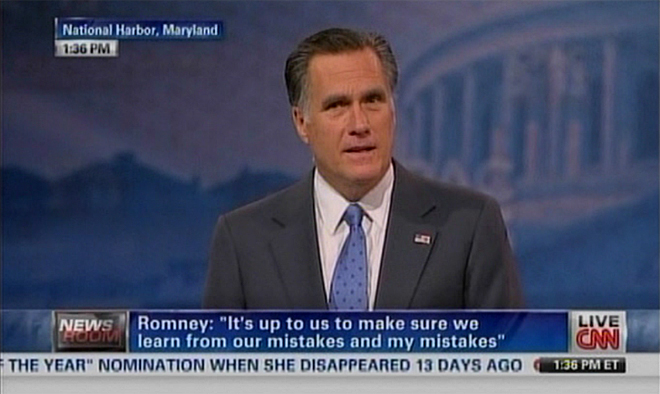Mitt Romney received an enthusiastic welcome at CPAC on Friday, where he graciously thanked conservatives for supporting his 2012 campaign, but offered little reflection as to why it ultimately failed.
“I’m sorry I won’t be your president,” Romney said. “I will be your coworker and I’ll work shoulder by shoulder beside you.”
Much of Romney’s address — his first since his November loss — resembled his old stump speech, right down to the various anecdotes about individual Americans struggling through tough economic times or fleeing oppression abroad.
Romney did not offer his take as to how and why Obama defeated him, but he expressed a general optimism that “conservative vision can attract a majority of Americans.”
“As someone who just lost the last election, I’m probably not the best person to chart the course for the next election,” Romney said. “That said, I do have advice.”
Romney went on to offer one concrete pearl of wisdom: look to the states.
“Perhaps because I am a former governor, I would urge you to learn the lessons that come from some of our greatest success stories — the 30 Republican governors,” Romney said. Wading into slightly more controversial territory, Romney said Republicans “particularly need to hear from the governors from blue and purple states.”
Among the names he listed was New Jersey Gov. Chris Christie, an early Romney backer who was snubbed by CPAC organizers for his lapses into moderation even as the same policies have made him wildly popular within his state. Christie, along with Ohio Gov. John Kasich (who Romney also praised), recently decided to expand Medicaid coverage in their state by accepting federal aid opened up by Obamacare. In an awkward twist, Romney was introduced by Gov. Nikki Haley (R-SC), a decidedly red state executive who used her brief remarks to declare that “as long as I am governor of South Carolina, we will not expand Medicaid.”
Romney’s remaining advice was mostly standard campaign fare like “do whatever you can to keep America strong.”
The strong applause Romney received reflected the generally tolerant, if not warm, reaction he’d elicited in the speakers that preceded him. A panel earlier in the day that promised an “autopsy” of the election was so bloodless in its criticism that moderator Tucker Carlson expressed his shock at the “lack of mention of the Romney campaign itself.” There were some passing complaints about Romney’s personal charisma — National Review columnist John Fund called him “the antithesis of a populist candidate” — but most handwringing was directed at more marginal issues like the RNC’s tech operation. Such complaints were drowned out by a parade of speakers reassuring the audience that the GOP was just fine, thank you, they just needed to find the right combination of words that would suddenly make young, minority, and female voters realize it.
“Just because the election didn’t go our way, that means we’re supposed to change our principles?” Romney’s running mate, Paul Ryan, asked in his own address. “We’re supposed to just go along to get along? We reject that view.”
The most direct shot at Romney came from Texas Gov. Rick Perry, who had his own reasons for revenge after his opponent painted him as a liberal in the primaries.
“The popular media narrative is that this country has shifted away from conservative ideas, as evidence by the last two presidential elections,” Perry said in a speech Thursday. “That might be true if Republicans had actually nominated conservative candidates in 2008 and 2012.”
There was one glaring exception to the generally polite tone toward Romney: immigration. A variety of speakers and panelists openly called on conservatives to abandon Romney’s hardline stance and embrace reform, pointing to their last nominee’s disastrous showing with Latinos in November. But even here Romney was hardly the focus of their anger and practically never came up by name. Reformers were well aware his border hawk position — like the rest of his platform — was handed to him by the conservative movement and not the other way around. A number of Romney’s own top strategists and fundraisers are already leading efforts to move the GOP left on the issue.






